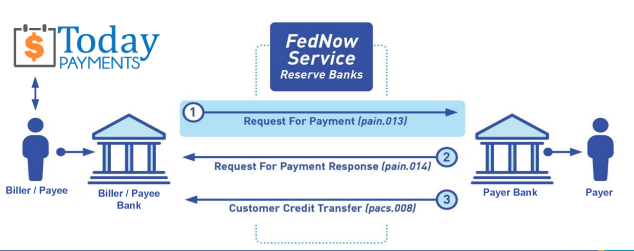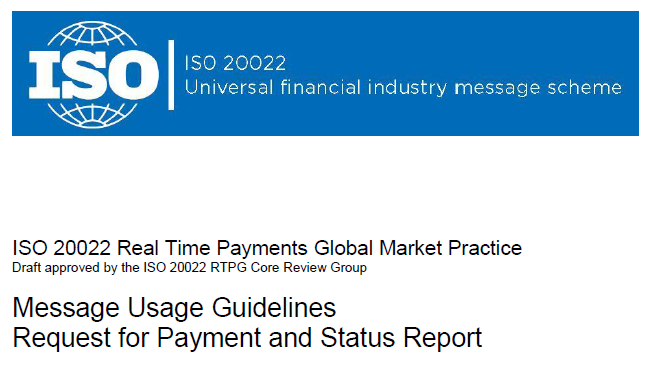Create RfP File
How to Create FedNow and RFP Request for Payment File
Create RfP File – Real-Time Payment Requests via FedNow® and RTP®
Create RfP File refers to the process of generating structured Request for Payments (RfPs) using ISO 20022-compliant formats like XML or HTML. These files can be imported, uploaded, and downloaded through payee dashboards connected to U.S. financial institutions, enabling seamless real-time payment transactions across the FedNow® Service and RTP® network.
Payees can initiate a single payment or set up numerous recurring transactions, with guaranteed good funds received within seconds—making the entire process more efficient, secure, and cash flow friendly.
Build Structured Payment Requests with Confidence
Creating an RfP file is more than generating an invoice—it’s building a standardized, secure financial message that allows you to request and receive money in real time. Each file includes data fields for payer identification, alias-based MID, transaction amount, and a secure payment URL.
Built in XML or HTML and compliant with ISO 20022, the format ensures compatibility with all banks and credit unions using FedNow® or RTP®. Once uploaded, the file triggers a real-time request to the payer. When the payer responds, settlement is immediate, funds are final, and the payee can fulfill orders or deliver services instantly.
Features When You Create an RfP File
Use of ISO 20022, XML and HTML Formats
Every RfP file is structured with ISO 20022-compliant
elements, ensuring accuracy, validation, and financial
interoperability across U.S. institutions.
Import, Upload, and Download via Payee
Dashboards
Payees can upload RfP files, track
response statuses, download confirmation records, and automate
reconciliation through a secure dashboard interface.
Support for One-Time and Recurring
Transactions
Whether it’s a one-off invoice or a
scheduled subscription, the same file format supports periodic
billing for ongoing business needs.
Real-Time Processing with FedNow® and
RTP®
Files are routed through the fastest
available network (FedNow® or RTP®), ensuring payment is received
within seconds of payer confirmation.
Alias-Based MID Assignment for Accurate
Tracking
Create RfP files using mobile numbers
or email addresses as aliases for Merchant Identification Numbers,
allowing individual tracking and control.
Hosted Payment Links Built into Every
RfP
Each record includes a hosted link for the
payer, making the payment experience seamless via mobile or
desktop—no extra portals required.
Good Funds Guaranteed Upon Completion
Once payment is confirmed, the funds are final and immediately
usable by the payee—reducing fraud risk, delays, or reversals.
Why Create RfP Files Through TodayPayments.com
1. Generate ISO 20022-compliant RfP files
in XML or HTML
2. Upload and process them across all
U.S. banks and credit unions
3. Use alias-based MIDs for
easier reconciliation and fund routing
4. Trigger
one-time or recurring RfPs using real-time payment networks
5. Track payment responses, confirmations, and audit logs in
one dashboard
6. Eliminate waiting periods and improve
cash flow visibility
7. Fully digital onboarding—no bank
branch required
8. Seamless integration with accounting
tools like QuickBooks® Online
To create a FedNow Instant and Real-Time Payments (RTP) Request for Payment (RfP) file before uploading it into your business bank’s system, you will need to follow a structured process. The Request for Payment (RfP) must comply with the required file formats and data structure, typically based on ISO 20022 standards for FedNow and RTP.
Here’s a step-by-step guide on how to create the RfP file, validate it, and prepare it for uploading to your bank:
Step 1: Gather the Required Payment Information
Before creating the RfP file, gather the necessary details for each transaction. The following key information will be included in the RfP:
- Payee Information:
- Payee Name
- Payee Bank Account Number
- Payee Bank Routing Number (ABA)
- Payer Information:
- Payer Name
- Payer Bank Account Number
- Payer Bank Routing Number (ABA)
- Payment Information:
- Payment Amount
- Payment Currency (e.g., USD)
- Payment Due Date
- Invoice Reference Number or any other identifying information related to the payment
Step 2: Create the RfP File in ISO 20022 XML Format
For FedNow and RTP, ISO 20022 XML is the standard file format. Below is a simplified XML structure for a Request for Payment (RfP):
Example ISO 20022 XML Structure for a Single RfP:
xml
<?xml version="1.0" encoding="UTF-8"?>
<Document xmlns="urn:iso:std:iso:20022:tech:xsd:pain.013.001.07">
<ReqForPaymt>
<PayeeInfo>
<Name>ABC Corp</Name>
<AcctNumber>123456789</AcctNumber>
<RoutingNumber>987654321</RoutingNumber>
</PayeeInfo>
<PayerInfo>
<Name>John Doe</Name>
<AcctNumber>987654321</AcctNumber>
<RoutingNumber>123456789</RoutingNumber>
</PayerInfo>
<PaymentInfo>
<Amount>500.00</Amount>
<Currency>USD</Currency>
<DueDate>2024-10-01</DueDate>
<InvoiceRef>INV-1001</InvoiceRef>
</PaymentInfo>
</ReqForPaymt>
</Document>
Key XML Elements Explained:
- Document: This is the root element of the XML file.
- ReqForPaymt: Contains the details of the Request for Payment.
- PayeeInfo: Contains information about the party requesting the payment (the payee).
- PayerInfo: Contains information about the party responsible for making the payment (the payer).
- PaymentInfo: Holds the payment details, including the amount, currency, due date, and invoice reference.
Step 3: Automate the Creation of RfP Files (Optional)
If you need to create multiple RfP files for batch uploads, you can automate the creation of these files using a script. Below is a Python script that generates ISO 20022 XML files from a list of transactions in CSV format.
Example Python Script to Generate RfP XML Files from CSV:
python
import pandas as pd
import xml.etree.ElementTree as ET
# Load the CSV containing payment details
data = pd.read_csv('rfp_data.csv')
# Function to create an XML file for each RfP
def create_rfp_xml(row):
root = ET.Element("Document", xmlns="urn:iso:std:iso:20022:tech:xsd:pain.013.001.07")
rfp = ET.SubElement(root, "ReqForPaymt")
# Payee Information
payee = ET.SubElement(rfp, "PayeeInfo")
ET.SubElement(payee, "Name").text = row['PayeeName']
ET.SubElement(payee, "AcctNumber").text = str(row['PayeeAccount'])
ET.SubElement(payee, "RoutingNumber").text = str(row['PayeeRouting'])
# Payer Information
payer = ET.SubElement(rfp, "PayerInfo")
ET.SubElement(payer, "Name").text = row['PayerName']
ET.SubElement(payer, "AcctNumber").text = str(row['PayerAccount'])
ET.SubElement(payer, "RoutingNumber").text = str(row['PayerRouting'])
# Payment Information
payment = ET.SubElement(rfp, "PaymentInfo")
ET.SubElement(payment, "Amount").text = str(row['Amount'])
ET.SubElement(payment, "Currency").text = row['Currency']
ET.SubElement(payment, "DueDate").text = row['DueDate']
ET.SubElement(payment, "InvoiceRef").text = row['InvoiceRef']
# Create an ElementTree object and save the XML to a file
tree = ET.ElementTree(root)
tree.write(f'rfp_{row["InvoiceRef"]}.xml')
# Generate XML files for each row in the CSV
for _, row in data.iterrows():
create_rfp_xml(row)
Sample CSV Format:
csv
PayeeName,PayeeAccount,PayeeRouting,PayerName,PayerAccount,PayerRouting,Amount,Currency,DueDate,InvoiceRef
ABC Corp,123456789,987654321,John Doe,987654321,123456789,500.00,USD,2024-10-01,INV-1001
XYZ LLC,2233445566,654321987,Jane Smith,1122334455,321654987,300.00,USD,2024-09-25,INV-1002
Step 4: Validate the RfP File
Before uploading the file to your bank, it’s important to validate that the XML file is compliant with the ISO 20022 standard and follows the specific requirements of FedNow or RTP.
- Use XML validators to check for any formatting errors or missing fields.
- Some banks provide tools to test your RfP files for format compliance before submission.
Step 5: Upload the RfP File to Your Business Bank’s Dashboard
Now that your Request for Payment files are ready, follow these steps to upload them to your bank’s dashboard:
a) Log in to Your Business Bank’s Dashboard:
- Log in to your bank’s online platform using your credentials.
b) Navigate to the Payments Section:
- Go to the section labeled FedNow Payments, Real-Time Payments (RTP), or Request for Payments (RfP).
c) Upload the RfP File:
- Select the Batch Upload or File Import option, depending on your bank’s setup.
- Choose the XML file (or multiple files) you generated.
- Review the file details to ensure everything is correct.
d) Submit for Processing:
- Once the file has been uploaded and validated by the bank’s system, submit the RfP file for processing.
Step 6: Monitor and Reconcile Payments
Once the RfP file is processed:
- FedNow and RTP provide real-time notifications for payment approval and settlement.
- Monitor the status of the payment requests via your bank’s dashboard (statuses may include Pending, Completed, or Rejected).
- If any requests are rejected, you will receive error messages indicating the issue (such as incorrect account information).
After the payments are completed, reconcile them in your internal accounting system.
Key Considerations:
- Data Accuracy: Double-check all details such as account numbers, routing numbers, and payment amounts.
- Format Compliance: Ensure that your XML file follows the correct ISO 20022 schema required by your bank.
- Batch Limits: Some banks may have limits on the number of transactions in a single batch file. Check with your bank to ensure compliance with these limits.
- Security: Use secure methods to transmit files, especially if your bank offers API-based uploads.
Conclusion
By following this guide, you can efficiently create and upload Request for Payment (RfP) files for FedNow Instant Payments and Real-Time Payments (RTP). This will allow you to request and process payments in real-time through your business bank, ensuring faster and more efficient payment operations.
Build and Send Real-Time Payment Files at TodayPayments.com
Ready to eliminate payment delays and unlock real-time revenue?
✅ Create RfP files using ISO
20022 XML or HTML
✅ Send one-time or recurring
payment requests with certainty
✅ Use hosted links
and alias-based MIDs to simplify the payer experience
✅
Route payments through FedNow® or RTP®
for instant good funds
✅ Manage it all from one
secure dashboard
✅ Go live today—no
paperwork, no in-person visit
Start building your real-time payment
infrastructure today at
https://www.TodayPayments.com
Create RfP File –
Structured for Speed. Built for Certainty.
Creation Request for Payment Bank File
Call us, the .csv and or .xml FedNow or Request for Payment (RfP) file you need while on your 1st phone call! We guarantee our reports work to your Bank and Credit Union. We were years ahead of competitors recognizing the benefits of RequestForPayment.com. We are not a Bank. Our function as a role as an "Accounting System" in Open Banking with Real-Time Payments to work with Billers to create the Request for Payment to upload the Biller's Bank online platform. U.S. Companies need help to learn the RfP message delivering their bank. Today Payments' ISO 20022 Payment Initiation (PAIN .013) shows how to implement Create Real-Time Payments Request for Payment File up front delivering a message from the Creditor (Payee) to it's bank. Most banks (FIs) will deliver the message Import and Batch files for their company depositors for both FedNow and Real-Time Payments (RtP). Once uploaded correctly, the Creditor's (Payee's) bank continues through a "Payment Hub", will be the RtP Hub will be The Clearing House, with messaging to the Debtor's (Payer's) bank.

... easily create Real-Time Payments RfP files. No risk. Test with your bank and delete "test" files before APPROVAL on your Bank's Online Payments Platform.
Today Payments is a leader in the evolution of immediate payments. We were years ahead of competitors recognizing the benefits of Same-Day ACH
and Real-Time Payments funding. Our business clients receive faster
availability of funds on deposited items and instant notification of
items presented for deposit all based on real-time activity.
Dedicated to providing superior customer service and
industry-leading technology.


1) Free ISO 20022 Request for Payment File Formats, for FedNow and Real-Time Payments (The Clearing House) .pdf for you manually create "Mandatory" (Mandatory data for completed file) fields, start at page 4, with "yellow" highlighting. $0.0 + No Support
2) We create .csv or .xml formatting using your Bank or Credit Union. If Merchants has created an existing A/R file, we CLEAN, FORMAT to FEDNOW or Real-Time Payments into CSV or XML. Create Multiple Templates. You can upload or "key data" into our software for File Creation of "Mandatory" general file.
Fees = $57 monthly, including Activation, Support Fees and Batch Fee, Monthly Fee, User Fee, Additional Payment Method on "Hosted Payment Page" (Request for file with an HTML link per transaction to "Hosted Payment Page" with ancillary payment methods of FedNow, RTP, ACH, Cards and many more!) + $.03 per Transaction + 1% percentage on gross dollar file,
3) Payer Routing Transit and Deposit Account Number is NOT required to import with your bank. We add your URI for each separate Payer transaction.
Fees Above 2) plus $29 monthly additional QuickBooks Online "QBO" formatting, and "Hosted Payment Page" and WYSIWYG
4) Above 3) plus Create "Total" (over 600 Mandatory, Conditional & Optional fields of all ISO 20022 Pain .013) Price on quote.
Each day, thousands of businesses around the country are turning their transactions into profit with real-time payment solutions like ours.
Activation Dynamic RfP Aging and Bank Reconciliation worksheets - only $49 annually
1. Worksheet Automatically Aging for Requests for Payments and Explanations
- Worksheet to determine "Reasons and Rejects Coding" readying for re-sent Payers.
- Use our solution yourself. Stop paying accountant's over $50 an hour. So EASY to USE.
- No "Color Cells to Match Transactions" (You're currently doing this. You won't coloring with our solution).
- One-Sheet for Aging Request for Payments
(Merge, Match and Clear over 100,000 transactions in less than 5 minutes!)
- Batch deposits displaying Bank Statements are not used anymore. Real-time Payments are displayed "by transaction".
- Make sure your Bank displaying "Daily FedNow and Real-time Payments" reporting for "Funds Sent and Received". (These banks have Great Reporting.)
Contact Us for Request For Payment payment processing

